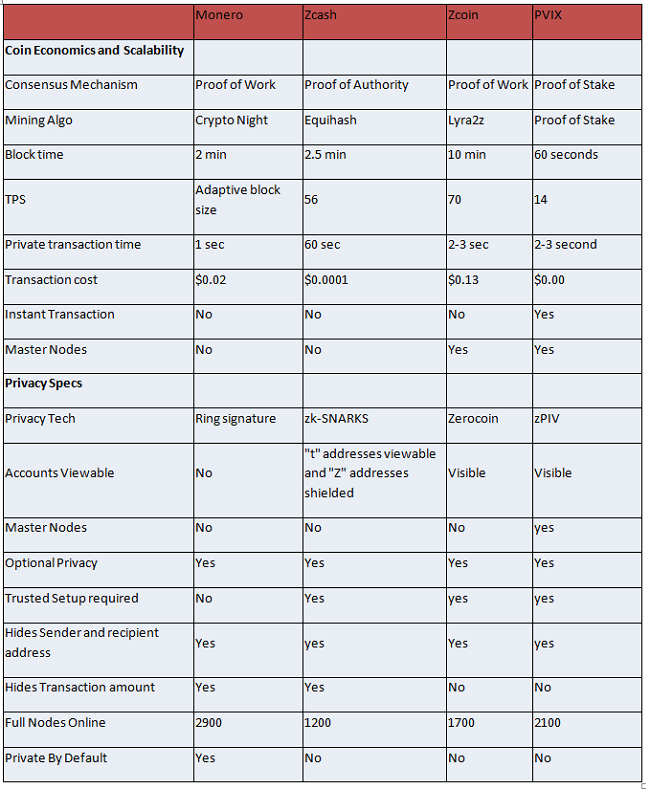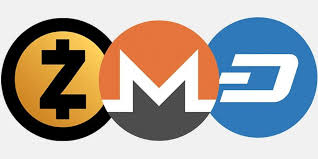Privacy coins are the cryptocurrencies which are fully anonymous and untraceable. There are various privacy coins and the major ones include
- Monero
- Zcash
- Zcoin
- PIVX
1. Monero
Monero coin, originally forked from Bytecoin, is a secure private untraceable coin. Monero uses RingCT privacy technology. It provides privacy through unique features such as
- For senders (Ring Signatures)
- For receivers (Stealth address)
- For the transaction (Ring CT (Confidential transaction)
Monero, which was previously known as Bitmonero, is the first coin to use CryptoNote technology. Cryptonote is a next-generation platform useful for creating anonymous and secure cryptocurrencies.
Crypto Note:
It is an open-source technology and concept for the cryptocurrencies of the future. The main features are
- Untraceable payments
- Unlinkable Transaction
- Double spending proof
Untraceability:
Monero uses a special technology called ring signatures which shuffles users' public keys in order to eliminate the possibility to identify a particular user.
Ring signatures:
Ring signature is a type of digital signature that can be performed by any member of a group of users that each have keys. A ring signature is composed of the actual signer who is then combined with non-signers to form a ring and it helps to mask the origin of the transaction. All members are considered equal and valid in this ring.
Stealth Address:
Stealth address is a technology used for protecting the privacy of the receivers of cryptocurrencies. It requires the sender to create a random one time address for the given transaction so that different payments made to the same payee are unlinkable.
RingCT: It is nothing but Ring Confidential Transaction (CT) used in Monero to improve transaction privacy by hiding the transaction amount sent.
Monero is fungible as every transaction is private by default. Monero hides the sender, recipient address and transaction amount.
In Monero, transactions are confirmed by distributed consensus and immutably recorded on the blockchain. Third parties do not need to be trusted to keep Monero safe (no trusted setup).
Monero has 2900 full nodes online -- higher the number of nodes, more decentralized and secure network.
Monero Scalability and transaction costs:
On an average, Monero blocks are mined every 2 minutes and its transaction confirmation time takes about 20-30 min on an average. Monero has implemented a dynamic size limit and it gets changed by itself. It doesn't have hard-coded maximum block size and so penalty fee is charged for large transactions.
Monero’s transaction cost was very higher earlier but after successful execution of hard fork “Monero 0.13.0 Beryillum Bullet” average transactions cost have been reduced from 60 cents to 2 cents after. Bulletproofs are a big deal it can increase the privacy of digital currency transactions and it also decrease their size.
Pros:
- It can give high privacy due to the ring signature feature.
- Transactions can’t be linked and traced.
- No blocksize limit.
- Hides recipient, sender addresses and transaction amount.
- Private on default.
Cons
- It has only a few wallet support due to the high privacy feature.
- They have concentrated mining and almost 35% of mining is controlled by only four large pools.
2. Zcash
Zcash is a privacy protecting, digital currency built on strong science. It is Bitcoin forked and uses zk-SNARKS (Zero knowledge Succinct Non-Interactive Argument of Knowledge proofs) for privacy.
Unique features of Zcash are
- Low transaction fees
- Optional privacy
- Z-addr to t- addr transactions
- t-addr to z-addr transactions
- Hides sender and receipt address and also amount send
Zero-knowledge proof is a method or process where one person (the prover) can prove to another party (the verifier) that something is true without revealing any information apart from the fact that this specific statement is true.
There are four types of transactions in the Zcash network
- Public transactions - where all transactions and amounts are revealed.
- Shielded Transactions - Zcash supports two types of addresses “t-addr” or transparent address and “Z- address “or shielded addresses. Transactions happen between “t-addr “ to “z-addr’’.
- Deshielded transactions - Private address to Public address, where the transaction amount is revealed through the deshielded transaction but the total balance in private address gets shielded.
- Private Transactions - z to z-addr where both addresses and transaction amount gets encrypted and not public visible.
Zcash Scalability and transaction costs:
New blocks are created roughly every 150 seconds and maximum block size 2 MB. The average time needed to create a private transaction is 60 sec. Zcash Transaction per second is 27 and the transaction cost is $0.001.
Pros
- Selective Privacy
- High anonymity
- Zcash has proper wallet support with Ledger Nano S and Trezer.
- Low transaction fees
Cons
- Requires trusted setup
- Proof size is large
- Takes longer time to create a private transaction
3. Zcoin
Zcoin is an anonymity and privacy-oriented cryptocurrency which uses Zero-knowledge proofs via Zerocoin protocol.
Zero- knowledge proof or Protocol
It is a method by which one party (prover) can send and receive coins without disclosing which specific coin belongs to them. The term Zero knowledge proof means that no information about the secret is revealed, but the second party called as Verifier is convinced that first party called as prover knows the secret.
Zerocoin works by allowing you to burn coins (otherwise known as Zerocoin mint) and later redeem an equivalent number of brand new coins (known as Zerocoin spend). It provides larger anonymity compared with other privacy cryptos. These new Zerocoins have no transaction history and with a lot of users minting coins at the same time, it becomes impossible to trace the newly minted coins to a particular user.
To mint a Zerocoin, a person generates random serial number S and encrypts this into a coin C by use of second random number R. These two numbers are used in cryptographic function to generate value “V”. The value V is posted to the blockchain to prevent it from being changed in the future.
Zcoin Scalability and TPS
Zcoin has high block time 10 min and maximum block size is 2MB. The average time needed to create private transaction is 2-3 sec. Zcoin Transaction per second is 14 and the transaction cost is $0.13.
Pros
- No need of mixer
- Does not require a trusted third party to provide anonymity
Cons
- Zerocoin does not hide transaction values.
- Requires trusted setup.
4. Private Instant Verified Transaction (PIVX)
PIVX is a privacy-focused cryptocurrency based on a fork of DASH v0.12.0x core with Proof of Stake consensus mechanism with a focus to improve some of the issues of Bitcoin like scalability and practicality.
Major PIVX features are
- SwiftTX: Transaction time is instant using “SwiftTX”. Transaction confirmation is done by the masternodes instead of needing the network's approval. SwiftX transaction is confirmed and spendable within seconds.
- Zerocoin PIV (zPIV): This feature allows users to spend anonymously. It is a mix of POS and zerocoin protocol. It reduces spend transaction size by 25% and increases the speed of verification and network performance. It helps to hide coin balance and transaction history. It takes 0.5 seconds to mint and 2.54 seconds to spend ZPIV.
- POS 3.0 Bitcoin Core 0.010x: PIVX is the first Proof of Stake cryptocurrency to be based on the version 0.10 or higher Bitcoin codebase. Proof of Stake is a method of distributed consensus and rewards are given to stakeholders who hold PIVX in a wallet.
- Masternode: Masternodes are mighty elements of PIVX network. These are nodes running the same wallet software on the same blockchain to provide extra services to other networks. To run a masternode, we should dedicate 10,000 PIV as collateral. The major services provide by masternodes are anonymization, increased privacy of transactions, instant transactions, decentralized governance, and budgeting system.
- See-saw algorithm: PIVX has developed See-saw reward balance system. Higher the masternode count, the smaller the reward portion of each POS block that will be paid out to the customers. Conversely, when the masternode count falls, the masternode reward portion is increased and staking node reward portion decreased.
PIVX Scalability and TPS:
PIVX has high block time of 1 min and maximum block size is 1MB. The average time needed to create private transaction is 2-3 sec. Transaction per second is 70 and the transaction cost is $0.003.
Pros
- It is fast and has low transaction fees. The instant transaction is possible using technology “SwiftTX”
- It uses Proof of Stake consensus mechanism so rewards and coin creation directly goes to PIVX owners not miners
- PIVX can be stored in Hardware wallet
- Passive income can be earned through its masternode system.
Cons
- Unlimited coin supply
- No trusted setup
- It doesn’t hide transaction amount
Comparison of Privacy coin:
The table shown below indicates comparison of Privacy based on privacy technology, scalability and coin economics.

Conclusion
Monero is highly rated privacy currency -- it is only currency that is untraceable, untrackable and unlinkable. The only problem with Monero is centralization of miners and lack of adoption.
Zcash also hides transaction amount like Monero but it uses zk-SNARKS privacy technology which takes more time for private transactions.
PIVX is fast and has less transaction fees. It is the early adopter which uses Proof of Stake consensus mechanism. It can privately send coins without being traced using Zerocoin Protocol (ZPIV). It uses “SwiftTX” to create instant transactions. But the only drawback is that it will not able to hide transaction amount. But it is very much undervalued
Technical:
Monero (XMRUSD):
Monero was trading lower following the footsteps of Bitcoin and lost more than 50% in this month. The pair has hit a low of $38.80 and is currently trading around $41.50.
It has formed a temporary top around $379.90 Mar 5th, 2018 and shown huge sell-off of more than 80%. The near-term resistance is around $52.10 (20- day MA) and any break above targets $63.40 (23.6% fib)/$73 (55 day EMA)/$83.70 (89-day EMA). The pair should break above $110 (200- day MA) for further bullish continuation.
In the daily chart, RSI is around 17 nearing over the sold zone and is showing bullish divergence. So there is a chance of pair is expecting to show a bounce back till $73.
On the lower side, near-term support is around $38 and any violation below targets $30/$16.
Zcash:
Zcash is trading weak for past 6-month and lost 85% from high of $381.75. It hits low of $49 shown a minor recovery. It is currently trading around $53.60.
The near-term resistance is around $65.50 (20- day MA) and any violation above targets $79.90 (61.8% fib)/$87 (55- day EMA)/$97.It should break above $97.
On the lower side, major support is around $49 and any break below confirms bearish continuation. A dip till $40/$30 is possible.
Zcoin:
Zcoin was trading weak and has lost more than 90% from high of $48.75 made on May 5th, 2018. It has hit a low of $4.21 and is currently trading around $4.39.
The pair is facing strong resistance around $5.45 (20- day MA) and any convincing break above targets $6 (23.6% fib)/$7.52 (20- day MA)/$8.80 (55- day EMA)/$10.18 (89- day EMA).
The major support stands around $4.20 and any break below targets $3.57/$3.
PIVX:
PIVX Major resistance is around $0.65 (20- day MA ) and any violation above targets $0.860 (55- day EMA)/$1.02.
On the lower side, support is around $0.4700 and break below that level confirms bearish continuation and a dip till $0.34 likely.
[Correction: The article has been edited to mention that Monero's transaction cost has reduced to 2 cents after successful hardfork. The table has also been updated accordingly.]


























Comment 0